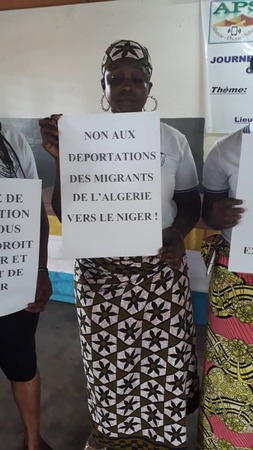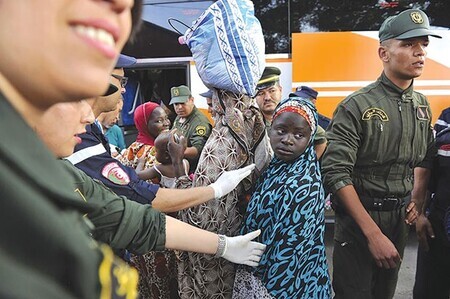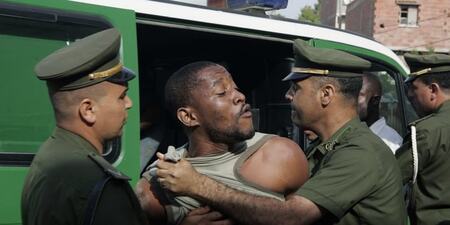Despite various criticisms from different human rights organisations, the massive and brutal deportations from Algeria to Niger continued steadily in April, May, June and July 2021, after the big wave of deportations in March when at least 6249 people were deported in just one month.

At least 7332 people were deported in 12 deportation convoys on 12th, 26th and 27th of April, 8th, 10th, 26th and 28th May, 20th and 21st of June and 1st, 2nd and 3rd of July 2021.
With this, the total number of people deported from Algeria to Niger by force and against their will since the beginning of 2021 amounts to a total of at least 13581 people.


Algerian security forces deporting migrant women Algerian security forces arresting a man for deportation
(photo from end 2019/early 2020) (photo from one of the previous deportation operations)
©Louiza Ammi/Liberté
These are the figures of deported persons who arrived at the Assamaka border post according to the information of the Alarme Phone Sahara Whistleblowers:
12th of April 2021: 1329 Niger nationals, including 300 minor girls and boys, in an official deportation convoy.
26th of April 2021: 76 nationals from different sub-Saharan African countries, including 12 minors, arrived in an unofficial deportation convoy.
27th of April 2021: 398 people, including 380 from Niger, including 9 minor girls and boys, in another official deportation convoy.
08th of May 2021: 455 people, including 3 minor girls and boys, in an unofficial deportation convoy. Apart from two citizens of Syria, the vast majority were nationals of various sub-Saharan African countries. The largest groups were 142 citizens from Guinea Conakry and 152 from Mali.
10th of May 2021: 1238 people, including 1218 Niger nationals, including 237 minor girls and boys, in a large official deportation convoy.
26th of May 2021: 517 nationals from various sub-Saharan African countries arrived on foot after being deported in an unofficial one. The largest groups were 189 citizens from Guinea Conakry and 135 from Mali.
28th of May 2021: 1060 Niger nationals, including 212 minor girls and boys, in another large official deportation convoy.
20th of June 2021: 251 nationals from various sub-Saharan African countries arrived in an unofficial deportation convoy.
21th of June 2021: 310 nationals from Niger, including 84 minor girls and boys, in another official deportation convoy.
1st and 2nd of July 2021: 683 nationals from various sub-Saharan African countries, including one minor girl, arrived in two unofficial deportation convoys. Again, the largest groups were 263 citizens from Guinea Conakry and 205 from Mali.
3rd of July 2021: 1015 people, of whom 991 were Niger nationals, including 206 minor girls and boys, in another large official deportation convoy.
The largest group among the deportees remain Niger nationals who are usually deported in official convoys. Among them, the largest groups of deportees are, as before, citizens from Mali and Guinea Conakry. But there were also citizens from many other countries, almost all of them in sub-Saharan Africa: Benin, Burkina Faso, Cameroon, Congo Kinshasa, Chad, Ivory Coast, Gambia, Ghana, Guinea Bissau, Liberia, Nigeria, Senegal, Sierra Leone, Sudan, Syria, Togo and Mauritania.
Deportations from Algeria to Niger: Persecution, violence and danger of death in the desert
For several years, there have been regular waves of mass deportations from Algeria to Niger on the basis of a bilateral agreement signed in 2014. On the one hand, the victims of this agreement are citizens of Niger, many of whom live in Algeria in a context of often seasonal migration. Alongside them, nationals of many other sub-Saharan countries are regularly deported, especially in "unofficial convoys". This practice is not even foreseen in the agreement between Algeria and Niger, but the state of Niger is not able to stop it or simply lacks the will to confront Algeria.
Regularly, people transported in "unofficial" expulsion convoys are left in the border area between Algeria and Niger, in the middle of the desert. With this practice, the Algerian security forces always put the lives of the deportees at risk: The deportees have to walk between 15 and 20 kilometres through the desert in order to reach Assamaka, the first Nigerien village after the Algerian border. Hungry, dehydrated, and it is feared that many will not make it, if people are lost in the desert.
In order to deport them, migrants are stopped everywhere in the country, in the street, in their workplace, in their homes, in shops, etc. They are put in cells for several days, or even several weeks, where some of them claim to have been beaten and stripped of their belongings. Then, the exiled people are bundled into buses and sent back to the desert, to the border between Algeria and Niger. The images of this umpteenth scandal of inhumane treatment of sub-Saharan migrants by Algeria are unbearable.
These waves of raids, arrests and deportations since September 2020 are a direct result of the "migration reform" and the creation of an inter-ministerial commission to combat "irregular migration", announced by Algerian Interior Minister Kamel Beldjoud during a plenary session of parliament on 30th of September 2020. The consequence of such a political decision justifies conditions of arrest, detention and deportation by the Algerian government that are contrary to the fundamental principle of non-refoulement and are practices contrary to international human rights law and refugee law.
Systematic violations of children's rights
Another alarming aspect is the large number of at least 1063 minors, including unaccompanied children, deported from Algeria to Niger between 12th of April and 3rd of July 2021. In the official deportation convoy of 10 May 2021, the whistleblowers of Alarme Phone Sahara counted 61 unaccompanied children, most of them children from the Zinder region aged between 10 and 11, many of whom showed signs of abuse. Once again, the practice of separating minor children from their families and relatives and deporting them in violent and abusive conditions shows the disregard of children's rights by the Algerian security forces. According to Human Rights Watch, migrant children in Algeria had already been separated from their families and deported alone in previous deportation operations in October 2020.
Bus accidents in March 2021: Cases of dead and seriously injured persons not clarified yet
We recall once again that according to Algerian sources, including the "Association Agir Ensemble pour lutter Contre l'Immigration Clandestine (AAECC)", two cases of serious bus accidents occurred during deportation convoys. Once on a convoy that left Algiers on 12th of March with over 50 people killed according to Algerian sources. The second time on 25th of March somewhere on the road between Algiers and Tamanrasset with dozens of seriously injured people, of whom it is not sure if they survived. Until now, there has been no clarification on these cases from the Algerian authorities.
In view of all the above, Alarme Phone Sahara requests:
⦁ An immediate halt to the deportations and pushbacks of refugees and migrants from Algeria to Niger and other neighbouring ountries!
⦁ The cancellation of the deportation agreement between Algeria and Niger!
⦁ An immediate halt to the deportation of children and the separation of children from their parents!
⦁ An end to acts of theft and violence by Algerian security forces against migrants and refugees!
⦁ The commitment of the state of Niger to defend its citizens who suffer persecution, human rights violations and deportations in Algeria!
⦁ Truth and clarification from the Algerian state on what really happened in the deportation convoys that left Algiers on 12th and 25th of March 2021, especially if it is true that people were killed in bus accidents!
⦁ Algeria and Niger must stop collaborating with the policies of outsourcing European borders on African soil and taking military and security materials to use against the migrant population!

